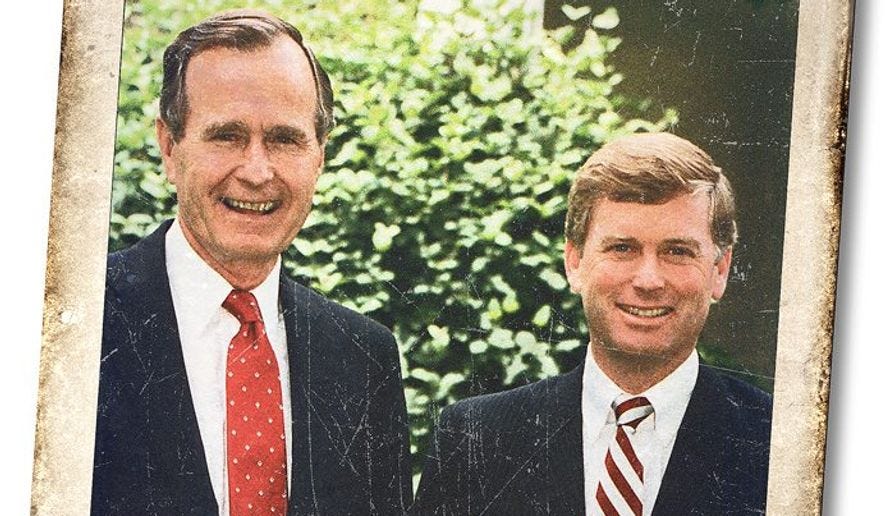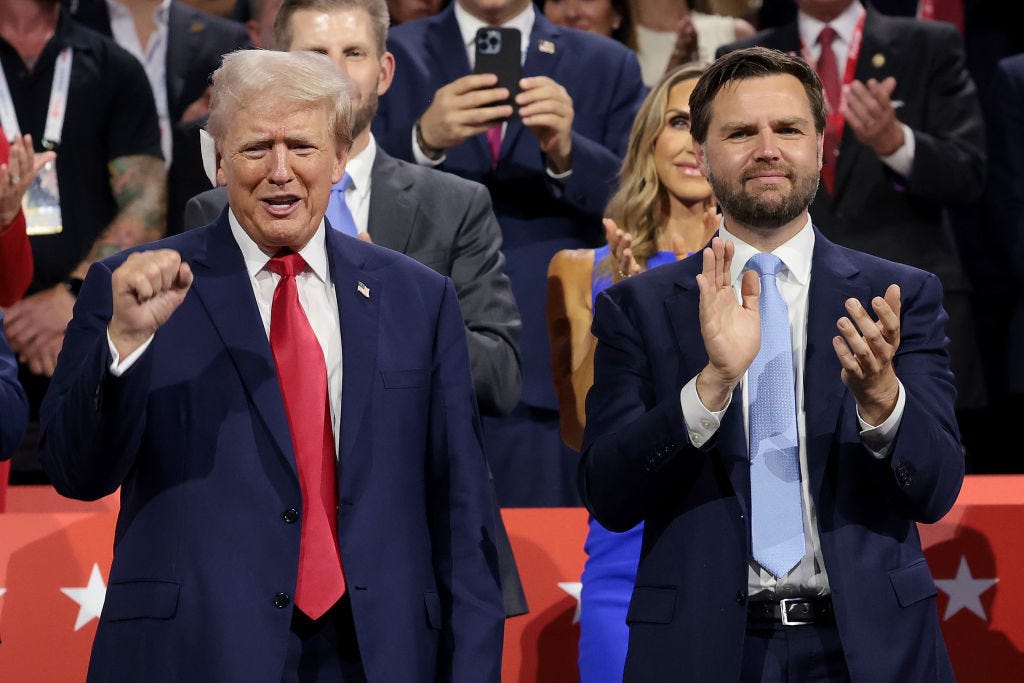Trump's Dan Quayle?
Donald Trump's selection of freshman US Senator JD Vance reminded me of George H.W. Bush's choice of US Senator Dan Quayle as his running mate
As I watched the GOP convention proceedings during our scorching heat wave here in the foothills of Shenandoah Mountain, Virginia, I remember the moment my C-SPAN feed announced the selection of Donald Trump’s running mate, 39-year-old freshman US Senator JD Vance (R-OH).
While I felt a tinge of disappointment - I was predicting and pulling for the selection of my popular Governor, Glenn Youngkin - thoughts of the first day of the 1988 GOP convention and Dan Quayle quickly followed.
I remember August 16, 1988, very well. I wasn’t in New Orleans that day, among the throngs of enthusiastic supporters welcoming the arrival that Monday of the GOP nominee, Vice President George H. W. Bush, at Spanish Plaza. I was the chief of staff to a freshman House GOP member, Jon Kyl (R-AZ). In a short-sleeve shirt on that humid August day, Bush gave a short speech about family and freedom and brought his children and grandchildren on stage.
Then he announced his vice presidential selection, second-term US Senator Dan Quayle (R-IN). Bush called him the future of the party. His selection surprised many. But the day before, while watching Quayle, a solid conservative, on a Sunday morning news show, I remarked how impressive he was and predicted that Bush would pick him. After all, Bush was down as much as 17 points in one poll to the Democratic nominee, Massachusetts Gov. Michael Dukakis, and needed to add a little pizazz to the ticket, picking the youthful and attractive Quayle.
Comparisons to John F. Kennedy were immediate, as were Quayle’s challenges. He appeared out of the crowd to stand with Bush and speak for about four minutes. He was seen as a little too cocky and exuberant. The challenges got only worse throughout the remainder of his career. He briefly sought the presidency himself in 2000 but dropped out in late September 1999, months before the Iowa caucus.
Quayle made one of those comparisons during his vice presidential debate with fellow US Sen. Lloyd Bentsen (D-TX), who unsuccessfully sought the Democratic presidential nomination in 1976. It led to one of the most famous exchanges in the history of political debate. “Senator, I knew Jack Kennedy,” Bentsen began, obviously waiting for the opportunity. “Jack Kennedy was a friend of mine. Senator, you’re no Jack Kennedy.” Ouch. Quayle visibly gulped at his rookie mistake. Quayle had already been on the defensive over his National Guard service (he rose to the rank of sergeant, but questions arose about whether his powerful publishing family had kept him from service in Vietnam) and inexperience (he had served more than a decade in Congress).
As with Trump’s selection of someone nearly half his age on Monday, Bush chose to put his generational stamp on the ticket. Bush remarked that Quayle, then 41, was born in the middle of the century and in the middle of the country. It was not without precedent. Gen. Dwight Eisenhower, then 61, chose US Senator Richard M. Nixon (R-CA), who was, like Vance, 39 years old and a war veteran. Nixon served in the House and two brief years in the Senate.
As Bush put the first Baby Boomer on the presidential ticket, Trump has now afforded the first Millenial his opportunity. More than a few “Gen Xers” ask why they’ve been skipped over.
Trump’s choice suggests that 1) he thinks he’s assured of victory and 2) he wants to cement his stamp on the Republican party. Besides making a generational choice and Vance’s youth, Trump doesn’t appear to gain anything politically. Ohio is a safe Republican state, but Vance also badly underperformed all other statewide candidates running on the GOP ticket in 2022. Vance only won the GOP nomination with 34 percent of the vote after Trump endorsed him and with the aid of $30 million from Senate GOP Leader Mitch McConnell’s (R-KY) Super PAC.
Vance has also metamorphosed over his brief political career, which began eight years ago when he wrote for the National Review and others. Vance is a good communicator, a skill he probably first honed as a combat journalist for the Marine Corps in Iraq and, of course, writing his best-selling book, “Hillbilly Elegy.” Editor of Yale Law Review, he was also a successful venture capitalist, becoming close friends with the co-founder of PayPal and Palantir, Peter Thiel, among others, including AOL founder Steve Case. Vance has aggressively evangelized to the high-tech community.
Vance was an atheist until his conversion to Catholicism in 2019. He was famously a “Never Trumper” in 2016, and we will see some of his attacks play endlessly in the media. His political conversion to MAGA Republicanism occurred sometime before he launched his only political contest for the US Senate in Ohio a little more than two years ago. Accusations of opportunism have long been aired.
That’s quite a metamorphosis in a relatively short time, just as he’s about to discover the Klieg Lights of a deeply contentious and polarizing national campaign. Is he ready?
As journalist Lee Fang has outlined, his Senate record may also surprise you.
His record shows a relatively high degree of cooperation with Senate Democrats, particularly on populist issues for enhancing oversight over corporations:
– Vance cosponsored legislation with Sen. Raphael Warnock, Warren, and Sanders to cap out-of-pocket expenses for insulin at $35 or 25% of a plan's negotiated price for Americans insured with private health insurance.– Vance and Sen. Sheldon Whitehouse introduced legislation that reshapes decades of corporate tax law, forcing corporate mergers of firms beyond $500 million in revenue to immediately pay capital gains taxes on shares earned through such deals.
– Vance cosponsored legislation with Sen. Dick Durbin to require price transparency and Medicare coverage status on certain pharmaceutical advertisements.
– Vance has worked with Sen. Sherrod Brown on legislation to tighten inspection requirements and hike penalties for rail cars carrying chemicals in response to the Norfolk Southern derailment disaster in East Palestine, Ohio last year.
-- Vance cosponsored Sen. Tim Kaine's legislation to repeal the authorization of the use of military force in Iraq.
— Vance and Sen. Tammy Baldwin sponsored legislation to prevent the licensing of government-funded advanced technology to foreign corporations. The bill was sponsored in light of revelations that specialized battery technology developed had been licensed to a Chinese firm.
Vance’s views about US involvement in Ukraine trouble many, telling former Trump campaign aide and Steve Bannon (now in prison) on his podcast that “I don't really care what happens in Ukraine one way or the other” and strongly opposing additional aid. He strongly supports Israel in its war against Hamas.
Vance’s best asset may be his wife, Usha, who plays a prominent role in the movie, “Hillbilly Elegy,” which starred Glenn Close as his “mamaw” or grandmother. Usha is a successful attorney in her own right, a fellow Yale Law School grad who clerked for Supreme Court Justice John Roberts and then-Circuit Judge Brett Kavanaugh. Another Yale Law fellow student is his Cincinnati neighbor, Vivek Ramaswamy.
It is undisputed that Vance is super bright, a skilled communicator, and has a profoundly moving personal story. We're about to discover whether he is up for the rigors of a national campaign, starting with his acceptance speech Wednesday night and the inevitable questions, spears, and arrows that will follow.
Just ask Dan Quayle.






